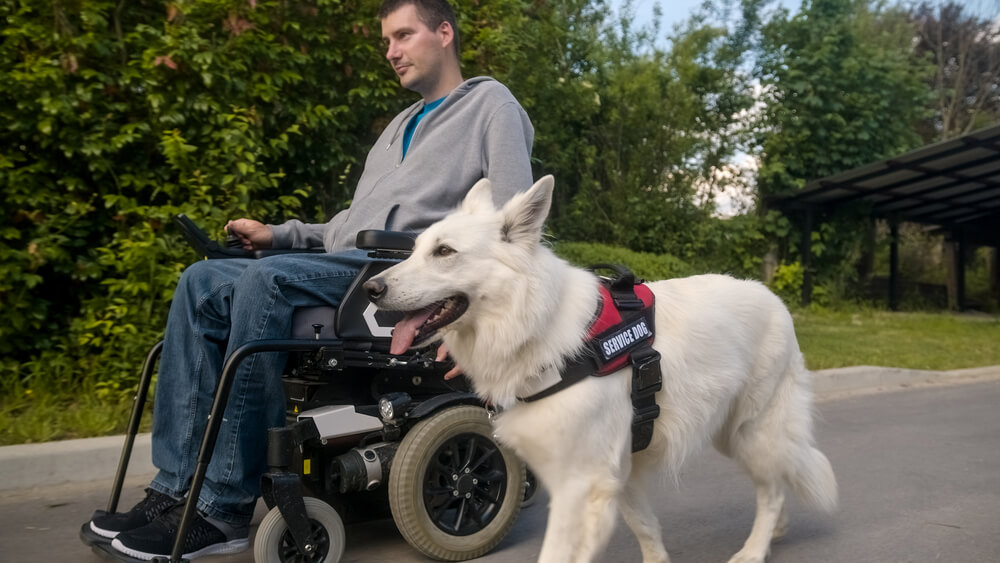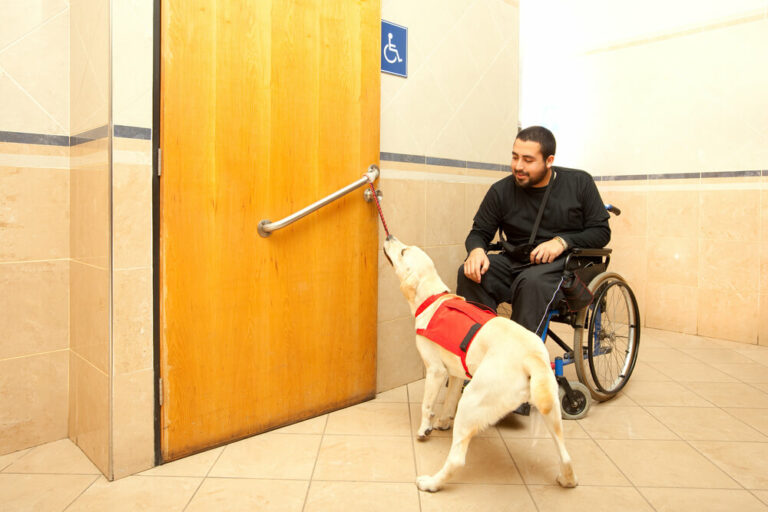
by Mychelle Garrigan, EDR Volunteer
As a business owner, it can be confusing understanding the regulations around service animals and what access they have to public spaces. It’s important to know what the American with Disabilities Act (ADA) says about service animals and be sure your staff and volunteers are trained to follow these regulations.
What law about service animals applies to businesses?
Service animals are addressed in Title III of the ADA, including definitions and access information. However, in Title I, the ADA does not go into detail about how this relates specifically to employment and how employers must address requests by an employee to bring a service animal to work with them.
How does Title III of the ADA define service animals?
Under Title III, section 4.2300, “”A service animal is an animal that is individually trained to do work or perform tasks that benefit an individual with a disability.”
Where can service animals go?
The ADA maintains that any privately owned business that serves the public cannot discriminate against a person with a disability who has a service animal with them. Examples of privately owned businesses that serve the public can include hospitals, medical facilities, movie theaters, restaurants, bakeries, coffee shops, gas stations, museums, libraries, sports arenas, taxis and hired transportation, hotels, retail shops, zoos, schools, gyms, and more.
How do you know if a service animal is really a service animal and not just a pet?
While many service animals wear brightly colored vests to indicate they are a working animal, this is not 100% the case. There is also no certification or specific documentation required that a person with a disability needs to carry with them to “prove” their animal is a service animal. You are however allowed to ask the person if their animal is a service animal. You may also ask them if it is required for them to have the animal due to a disability.
What types of animals can be service animals?
Under the ADA, only dogs and miniature horses can be considered service animals. Any breed of dog can become a service animal.

What types of tasks are service animals trained to do to assist persons with disabilities?
While many people are only familiar with service dogs such as guide dogs for the blind, there are many tasks that service dogs and miniature horses are trained to do to assist their owners:
- Seizure alert dogs are trained to alert their owners when a seizure is about to come on, giving them time to get to a safe place and alert medical personnel.
- Medical alert dogs can sense when a person with diabetes has low or high blood sugar and remind them to take their medication.
- Mobility dogs and horses can assist people with balance and stability.
- Psychiatric service dogs can provide specific relief for anxiety for individuals with PTSD and anxiety attacks such as leaning against them, placing a paw on them or reminding them to take anxiety medication.
What are businesses allowed to ask when a person enters their facility with a service dog?
You may ask:
- If the animal is a pet or a service animal;
- If the animal is required for a disability; (note, you may NOT ask what the person’s disability is, this is private!)
- What tasks has the animal been trained to do.
Does a “no pets” policy apply to service animals?
No, under the ADA, a service animal is not a pet and therefore a No Pets policy does not apply to them. You must allow a person with a disability to enter with their service animal.
If a business requires pet deposits, do those fees apply to service animals, too?
No, service animals are not pets and requiring any type of pet deposit, pet cleaning fee or pet maintenance fee is not allowed under the ADA. However, you do have the right to charge a person with a service animal for the cost of repairs and replacements if the animal happens to damage something at your business.
Does the ADA require service animals to be welcomed by taxis and other private transport?
Yes, service animals must be allowed to use taxis and other forms of private transportation. You are also not allowed to charge extra fees for including a service animal in a trip.

If a business has employees who are afraid of dogs or have allergies, can they deny admittance to a person with a service dog?
No, these are not legitimate excuses covered under the ADA for denying a service dog entry to a business.
When is it okay to exclude a service animal?
A service animal may be asked to leave if they display behavior that is a risk to the health or safety of the public and/or your employees. They can also be asked to leave if they are disruptive. Some examples of when a service animal could be asked to leave are:
- If a dog acts aggressively toward people in the facility, you can ask the owner of the service animal to remove the dog.
- A service animal must also be under the control of the owner at all times and not be a nuisance. For example, a service dog wandering around the facility off leash and not being managed by the owner can be asked to leave.
- In some rare instances, you can also ask that the animal be removed if it is causing a significant disruption, such as barking during a movie or theater performance.
- If the animal urinates or defecates inside your facility and is not housebroken, they can be asked to leave.
- If the service animal is not a dog or a miniature horse, you can ask them to leave as other species are not covered under the ADA.
- In some cases a miniature horse can be asked to leave if the facility is not able to reasonably accommodate their size and/or weight.
What does the ADA say regarding an employee wanting to bring their service animal to work?
While employment is addressed in Title I, the ADA does not go into detail about how service animals relate specifically to employment and how employers must address requests by an employee to bring a service animal to work with them. In general, a service animal should be allowed as part of a plan to provide effective accommodations to employees with disabilities.
Can an employer request documentation from an employee regarding a service animal?
The ADA does allow employers to ask for “reasonable” documentation from a medical professional regarding an employee’s disability, but does not specifically address documentation regarding service animals.
- Training: An employer can ask for specific documentation about the animal’s training, or in some cases if the animal was trained by the employee, they can ask for a demonstration. It is within an employer’s right to request that the animal be trained to handle being in the workplace, and this can vary depending on the workplace. For example a workplace that has many noises, sights and sounds happening frequently will require an animal that is trained to ignore these distractions and not become stressed around them.
- Certification: However, it’s important to note that an employer cannot ask for documents such as proof of certification as no such certification exists and while some trainers might provide this, many others do not.
Do the Same Rules Apply to Emotional Support Animals?
Emotional Support Animals (ESAs) are animals that assist a person with mental health issues such as depression, anxiety, and fear/phobias. They do not have any specific training and can be any animal (not just dogs or miniature horses). ESAs are not covered under the ADA. The only federal regulations that cover ESAs are the Fair Housing Act and the Transportation Act.
- The Fair Housing Act prohibits refusing housing to renters with an ESA.
- The Transportation Act allows one to take an ESA on an airplane, however, an ESA is considered a pet and is subject to an airline’s fees for pets and size/weight/breed restrictions. These do not apply to service animals.
Can an employee request they bring an ESA to their workplace?
Since Title I of the ADA is not specific about service animals, as well as ESAs, in the workplace, an employer can decide to allow an ESA as part of a reasonable workplace accommodation. However, employers are not required to do so.
Understanding the ADA and Service Animals
Service animals are often vital for their owners who use them to access the public in ways they would not be able to otherwise. It’s important as a business owner to understand federal regulations as they relate to service animals to provide a respectful experience for persons with disabilities who wish to enter your facility or apply for employment. If you need further clarification, please contact us at Employment Disability Resources.

